16th Annual NEW YORK INDIAN FILM FESTIVAL
May 7 - 14, 2016
Three Generations of Filmmakers
|
This program offers a rare chance to the audience to revisit films of three generations of Indian filmmakers who married their love for art with the commercial and produced a unique brand of cinema.
This year marks the 50th death anniversary of Bimal Roy. To mark the occasion we take one classic and rarely seen film of each of the three filmmakers – Bimal Roy (1909-1965), his son-in-law Basu Bhattacharya (1934-1997) and his son Aditya Bhattacharya, to explore their contributions to the history of Indian cinema.
All the films have been restored in their original pristine condition thanks to the efforts of Bimal Roy and Basu Bhattacharya's families, the National Film Archives of India in Pune and the film's producers.
|
| |
| SUJATA |
ANUBHAV |
RAAKH REDUX |
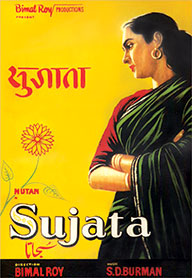 |
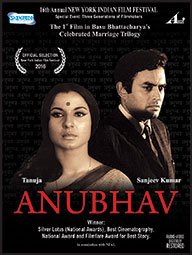 |
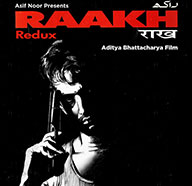 |
Sunday, May 8, 3:30pm.
Theater 4, Village East Cinema,
2nd Ave @ 12th street, NYC.
 |
Monday May 9, 6:30pm.
Theater 4, Village East Cinema,
2nd Ave @ 12th street, NYC.
 |
Tuesday May 10, 6:00pm.
Theater 4, Village East Cinema,
2nd Ave @ 12th street, NYC.

|
Sujata
(Print courtesy National Film Archives of India)
Directed by Bimal Roy
Feature Narrative
India 1959, 2hr 41min Hindi (w/English subtitles)
Cast: Nutan, Sunil Dutt, Shashikala, Lalita Pawar, Tarun Bose, Sulochana Latkar, Asit Kumar Sen
This copy of Sujata was especially restored for the 50th death anniversary of Bimal Roy.
Post screening Q&A with the late director's grandson and filmmaker Aditya Bhattacharya
Synopsis: As they celebrate the first birthday of their daughter Rama, men from a local village bring a baby girl to the home of government engineer Upendra and his wife Charu. The baby's parents were “untouchables” who died from cholera, leaving the girl an orphan with no one willing to take her in. Despite being of the higher Brahmin caste, Upendra and Charu reluctantly agree to take in the baby and eventually give her a name: Sujata.
In a powerful portrayal and denunciation of the caste discrimination that destroyed so many lives, Roy tells a story about real people struggling with social expectations and bigotry and the feelings of love and compassion that bind us together. Showcasing memorable performances by Sunil Dutt and Nutan with haunting music by composer S.D. Burman, SUJATA premiered at the 1960 Cannes Film Festival.
About the Director:
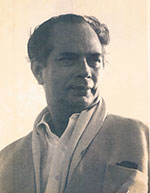 Roy first assisted Nitin Bose in P.C.Barua's Devdas, then in 1935, turned cameraman with K.L.Saigal's Devdas. In 1944, Roy made his debut as director with the path-breaking Udayer Pathey (Towards Sunrise). Roy had shot the entire film with left over film-stock and an ensemble cast of newcomers. The film created box office history. It ran continuously for a year, and its dialogue-booklets were sold at every street-corner tobacconist. Bimal Roy had arrived. When Bollywood star, Ashok Kumar invited Roy to Bombay in 1951 to direct Maa for the famed Bombay Talkies studios, he readily accepted, and took his entire team with him. After the success of Maa, Roy received offers to direct three films in Bombay, Parineeta, Baap Beti and Biraj Bahu. Roy decided to settle in Bombay, and in 1953, launched his own company: Bimal Roy Productions. The first film from Roy’s company was Do Bigha Zamin (Two Acres of Land). Sixty-three years later, it still features on every Top 10 list of the best Indian films. Roy went on to make a film every year, often with women as his protagonists. His films tackled crucial social issues: untouchability and the caste system in Sujata, village politics in Parakh, urban unemployment in Naukri, and prisoner rehabilitation in Bandini. Bimal Roy soon became a household name in India. Roy’s populist approach perhaps hindered the global recognition he merits. In India, Roy remains a legend. Today, sequences from his films are used to teach film grammar at the Film and Television Institute of India - probably the highest accolade for an Indian filmmaker. A large number of Roy’s cast and crew went on to become cinematic legends themselves. Roy first assisted Nitin Bose in P.C.Barua's Devdas, then in 1935, turned cameraman with K.L.Saigal's Devdas. In 1944, Roy made his debut as director with the path-breaking Udayer Pathey (Towards Sunrise). Roy had shot the entire film with left over film-stock and an ensemble cast of newcomers. The film created box office history. It ran continuously for a year, and its dialogue-booklets were sold at every street-corner tobacconist. Bimal Roy had arrived. When Bollywood star, Ashok Kumar invited Roy to Bombay in 1951 to direct Maa for the famed Bombay Talkies studios, he readily accepted, and took his entire team with him. After the success of Maa, Roy received offers to direct three films in Bombay, Parineeta, Baap Beti and Biraj Bahu. Roy decided to settle in Bombay, and in 1953, launched his own company: Bimal Roy Productions. The first film from Roy’s company was Do Bigha Zamin (Two Acres of Land). Sixty-three years later, it still features on every Top 10 list of the best Indian films. Roy went on to make a film every year, often with women as his protagonists. His films tackled crucial social issues: untouchability and the caste system in Sujata, village politics in Parakh, urban unemployment in Naukri, and prisoner rehabilitation in Bandini. Bimal Roy soon became a household name in India. Roy’s populist approach perhaps hindered the global recognition he merits. In India, Roy remains a legend. Today, sequences from his films are used to teach film grammar at the Film and Television Institute of India - probably the highest accolade for an Indian filmmaker. A large number of Roy’s cast and crew went on to become cinematic legends themselves. |
Anubhav - World Premiere of the film's restored print
(Print courtesy National Film Archives of India & Shemaroo Ent. Ltd.)
Directed by Basu Bhattacharya
Feature Narrative
India 1971, 2hr 19min Hindi (w/English subtitles)
Cast: Sanjeev Kumar, Tanuja Samarth, Dinesh Thakur, A. K. Hangal
This Copy of Anubhav has been specifically restored for NYIFF 2016's Three Generations of Filmmakers event with the generous support of Shemaroo Ent Ltd. This is a World Premiere screening for this restored version.
Post screening Q&A with the late director's son and filmmaker Aditya Bhattacharya
Synopsis:
Anubhav is a diffuse Hindi word that can mean a feeling, an experience, an understanding or realisation. The film centres on the relationship between Amar (played by Sanjeev Kumar) and Mita (Tanuja), a well-to-do Mumbai couple, who, after six years together, find themselves in a stale (and sexless,) rut. This is the first in a trilogy of Basu Bhattacharya films, focusing on moments of marital impasse in urban India. All three films were made under his own ‘banner'Aarohi Films. Amar and Mita have slid into unconscious estrangement and have taken to sleeping apart, but Mita decides to save the situation. Throwing herself into homemaking, she sacks all but one of her servants and starts cooking and tending to her man. Mita takes control of her life, her marriage and ultimately her man. While he's the boss at work, she takes complete charge at home, earning his respect and deference. Eating their home-cooked meals together, Amar and Mita start talking and rediscovering one another again.
About the Director:
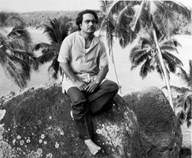 Basu Bhattacharya (1934-1997) was born into a religious family (priests to the Cossimbazar royals) in rural Bengal. After his higher education in Calcutta, an interest in films took him to Bombay. In 1958, he started as an assistant to Bimal Roy for Madhumati and Sujata. Bhattacharya would later marry Roy's daughter Nilanjana (Rinki). He made his debut with Teesri Kasam (1966,) starring Raj Kapoor and won the coveted President's medal beating favourite Satyajit Ray's Nayak which starred Uttam Kumar (both films coincidentally were lensed by the legendary Subrata Mitra.) In the 70's, as a pioneer of the ‘parallel cinema' his works focused primarily on marital relationships - a look at modern, urban marriages, their fragile nature and inherent contradictions. His marriage trilogy 'Anubhav', 'Aaviskaar' and 'Grihapravesh' are still considered the best in their genre in Hindi cinema. Basu‘da' (as he was popularly known) whilst admittedly influenced by Ingmar Bergman but (like his mentor, Roy,) kept to the popular idiom and wove in songs into his narrative - many of which were penned by Gulzar, another illustrious Bimal Roy alumni. He received the Silver Lotus (National Awards), Best Cinematography National Award (Nando Bhattacharya) and Filmfare Award for Best Story (Basu Bhattacharya) for Anubhav.
Basu Bhattacharya (1934-1997) was born into a religious family (priests to the Cossimbazar royals) in rural Bengal. After his higher education in Calcutta, an interest in films took him to Bombay. In 1958, he started as an assistant to Bimal Roy for Madhumati and Sujata. Bhattacharya would later marry Roy's daughter Nilanjana (Rinki). He made his debut with Teesri Kasam (1966,) starring Raj Kapoor and won the coveted President's medal beating favourite Satyajit Ray's Nayak which starred Uttam Kumar (both films coincidentally were lensed by the legendary Subrata Mitra.) In the 70's, as a pioneer of the ‘parallel cinema' his works focused primarily on marital relationships - a look at modern, urban marriages, their fragile nature and inherent contradictions. His marriage trilogy 'Anubhav', 'Aaviskaar' and 'Grihapravesh' are still considered the best in their genre in Hindi cinema. Basu‘da' (as he was popularly known) whilst admittedly influenced by Ingmar Bergman but (like his mentor, Roy,) kept to the popular idiom and wove in songs into his narrative - many of which were penned by Gulzar, another illustrious Bimal Roy alumni. He received the Silver Lotus (National Awards), Best Cinematography National Award (Nando Bhattacharya) and Filmfare Award for Best Story (Basu Bhattacharya) for Anubhav. |
Raakh Redux
Directed by Aditya Bhattacharya
Feature Narrative
India 1989-2011, 114min Hindi (w/English subtitles)
Cast: Aamir Khan, Supriya Pathak, Pankaj Kapur, Jagdeep, Master Ahmed Khan, Naina Balsaver
Synopsis: One night in an unnamed Indian city, young Aamir Hussein is forced to watch in impotent frustration as his girlfriend Neeta is brutally gang-raped in an assault led by the scion of the Karmali mafia family. Aamir's inability to do anything about the crime sees him leave home and sink into the city's underbelly where he encounters the flotsam and jetsam of the decaying metropolis, chief amongst whom is taciturn ex-cop P.K., who, having his own axe to grind against the Karmali clan, helps the boy Aamir become a man and exact revenge. Writer/Director Aditya Bhattacharya's dystopian vision of modern India made Raakh an instant cult classic when released in 1989 and immediately became a benchmark film for gangster noir from which celebrated directors like Sudhir Mishra, Ram Gopal Varma and Vinod Chopra drew inspiration.
About the Director:
 Aditya Bhattacharya is an independent writer/director/producer based in Mumbai and Barcelona. Bhattacharya’s award winning films have played internationally including at: The Rotterdam Film Festival, SXSW, The Cairo Int’l Film Festival, Seattle and Goa Film Festivals. Aditya Bhattacharya is an independent writer/director/producer based in Mumbai and Barcelona. Bhattacharya’s award winning films have played internationally including at: The Rotterdam Film Festival, SXSW, The Cairo Int’l Film Festival, Seattle and Goa Film Festivals.
He has been an actor, renowned chef of Indian cuisine in Rome, Italy and a prolific photojournalist. His directorial debut RAAKH was Indian superstar, Aamir Khan’s (THREE IDIOTS, LAGAAN) first starring role and the first Hindi feature for acclaimed cinematographer Santosh Sivan (BEFORE THE RAINS) and for India’s top Editor, Sreekar Prasad. SENSO UNICO, his sophomore feature is the only Italian film ever made by an Indian. Following that Aditya made DUBAI RETURN, the first Indian film to star Irrfan Khan, (THE LUNCHBOX) which is presently awaiting release. |
|
A note from Aditya Bhattacharya:
When my grandfather, Bimal Roy died, he was just a little older than I am today. In 23 years, he redefined the cinema of his time and gave us (at least) seven classics. My father, Basu Bhattacharya, who started as a junior assistant to my grandfather, went on become a giant in his own right and with his very first release, Teesri Kasam (The 3rd vow) beat the venerable Satyajit Ray to a President's gold medal, India's highest cinematic accolade.
I started young as well. My 1st feature Raakh (Ashes) featuring my then unknown classmate Aamir Khan “showed promise” the critics said. In the 25 or so years that followed however, I have slowed down. Raakh remains my only ‘properly' released feature. The next four have had various kinds of troubles or misfortune. And I am now battling to keep my (American) 5th on track...
Black sheep?
Dark horse?
You'd need to ask those fortunate enough to have seen (the rest of) my work at an Industry screening or Festival.
My father and my grandfather before him did not plan for success. Their lives and journeys (from the outskirts of Dhaka and rural Bengal to Bombay) were rich with experience that they then brought to the screen. Every film was a labour of love, a battle and almost always a huge commercial risk.
I have been slower. Unlike them, I was born privileged and needed to first ‘get a life' (-still a work in progress.) And I have made ‘only' four and a half films. But I have made them with my all and with every frame I have aspired to be worthy of my legacy.
Like I once said in an interview, “Unlike many, I don't need to search or travel for a place of worship, my gods, are at home.”
Recent write-ups on Bimal Roy and Basu Bhattacharya:
|
| |
|
|
|

